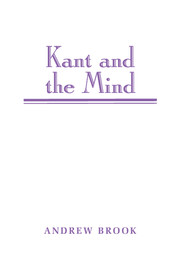Book contents
- Frontmatter
- Contents
- Preface
- 1 The contemporary relevance of Kant's work
- 2 Kant's theory of the subject
- 3 Kant's conception of awareness and self-awareness
- 4 Kant's theory of apperceptive self-awareness
- 5 The mind in the Critique of Pure Reason
- 6 The first-edition subjective deduction: the object of ‘one experience’
- 7 Kant's diagnosis of the Second Paralogism
- 8 The Third Paralogism: unity without identity over time
- 9 The second-edition subjective deduction: self-representing representations
- 10 Nature and awareness of the self
- Notes
- Bibliography
- Index of passages cited
- General index
3 - Kant's conception of awareness and self-awareness
Published online by Cambridge University Press: 05 June 2012
- Frontmatter
- Contents
- Preface
- 1 The contemporary relevance of Kant's work
- 2 Kant's theory of the subject
- 3 Kant's conception of awareness and self-awareness
- 4 Kant's theory of apperceptive self-awareness
- 5 The mind in the Critique of Pure Reason
- 6 The first-edition subjective deduction: the object of ‘one experience’
- 7 Kant's diagnosis of the Second Paralogism
- 8 The Third Paralogism: unity without identity over time
- 9 The second-edition subjective deduction: self-representing representations
- 10 Nature and awareness of the self
- Notes
- Bibliography
- Index of passages cited
- General index
Summary
Having said something about Kant's theory of the subject, I shall turn now to his views on awareness and self-awareness. Theory of the subject and theory of awareness cannot be completely separated, of course; theories of synthesis and of the unity of experience and awareness are parts of a theory of awareness. A number of general questions about awareness and self-awareness as such are so central to understanding Kant's ideas about the mind, however, that the topic deserves separate treatment. These questions include: To what did Kant use ‘Bewuβtsein’ (awareness) and ‘Selbstbewuβtsein’ (self-awareness) to refer? What sort of distinction did he take the two terms to mark? What did he understand the referent or referents of these terms to be like? How did he think awareness is related to self-awareness? As well as being interesting in their own right, these questions are also closely connected to the task of figuring out what Kant meant by his notions of inner and outer sense. There are difficulties associated with answering all of these questions. Unlike his treatment of synthesis, unity, and the like, Kant did not really have a theory of awareness or self-awareness. He took the notions as unproblematic and said little about them directly. Thus, our task is more to reconstruct what he must have believed than to lay out any theory he gave. It is not even easy to determine how many different forms of awareness Kant thought there were, let alone what characterized them.
- Type
- Chapter
- Information
- Kant and the Mind , pp. 46 - 69Publisher: Cambridge University PressPrint publication year: 1994



